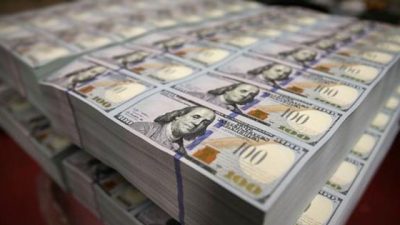
Nigeria’s foreign exchange (FX) reserve has experienced a sharp decline of about $1.02 billion within 18 days, as the Central Bank of Nigeria (CBN) continues its aggressive defence of the naira.
As of April 4, 2024, the FX reserves stood at $33.43 billion, down from $34.45 billion on March 18, 2024, according to the latest data from the CBN.
Nigeria’s foreign exchange reserve plummeted to its lowest level since February 20, 2024, when it was $33.42 billion. This marks a decisive end to a period of steady accrual, during which the reserve witnessed a 43-day surge, accruing $1.28 billion between February 5 and March 18, 2024. The CBN earlier attributed the rise to increased remittance payments from Nigerians abroad and heightened interest from foreign investors in local assets, including government debt securities. The apex bank also noted that the increase was due to reforms in the foreign exchange market and an increase in oil production amongst others.
The downward trend reflects a significant drawdown in the reserves, which have been depleting since March 18, when they peaked at $34.45 billion. The reserves dropped to $34.39 billion on March 19 and continued to fall steadily, hitting $33.57 billion by April 2, and further sliding to $33.43 billion by April 4. This marks a decline of $1.02 billion within 18 days, indicating the pressure on the reserves amid ongoing efforts to stabilize the local currency.
CBN’s FX Interventions
The CBN has been actively intervening in the foreign exchange market to shore up the naira, which has been under pressure from various economic factors. This intervention often involves the sale of dollars to ensure sufficient liquidity in the market, an action that has likely led to a decrease in FX reserves.
Within the 18-day period under review, the CBN announced the complete clearance of the valid foreign exchange backlog and the sale of $10,000 foreign exchange to each Bureau De Change operator (BDC) in Nigeria at a rate of N1,251/$1.
What You Should Know
The depletion of FX reserves is a cause for concern as it reflects the state of the country’s balance of payments and its ability to meet international obligations. A significant decline in the reserves can affect investor confidence and may lead to a credit rating downgrade, which can further impact the nation’s borrowing costs.
Nigeria faces multiple economic challenges, including theft and losses in the oil and gas sector, which have traditionally been a significant source of FX for the country. The decrease in reserves may also limit the CBN’s ability to intervene in the currency market, potentially leading to further depreciation of the naira.
The International Monetary Fund (IMF) recently projected that Nigeria’s foreign reserve is expected to see a significant reduction, falling to $24 billion in 2024.
The IMF anticipates a challenging period through 2024–25 for Nigeria’s financial account, exacerbated by an absence of new Eurobond issuances, significant repayments of existing funds and Eurobonds totalling $3.5 billion, and continued portfolio outflows. However, it projected a hopeful recovery to $38 billion by 2028 as portfolio inflows are forecasted to increase.
Policymakers may need to balance immediate currency stabilisation efforts with long-term economic strategies to ensure the health and stability of Nigeria’s financial position on the global stage.(Nairametrics)

